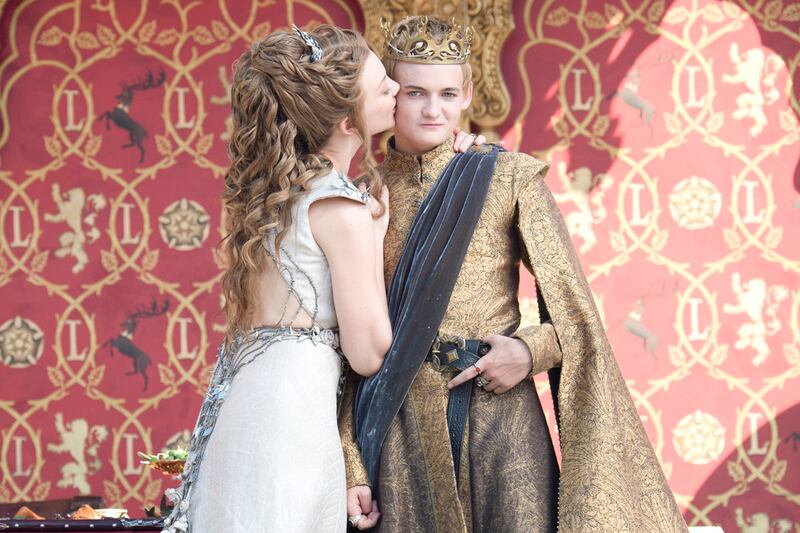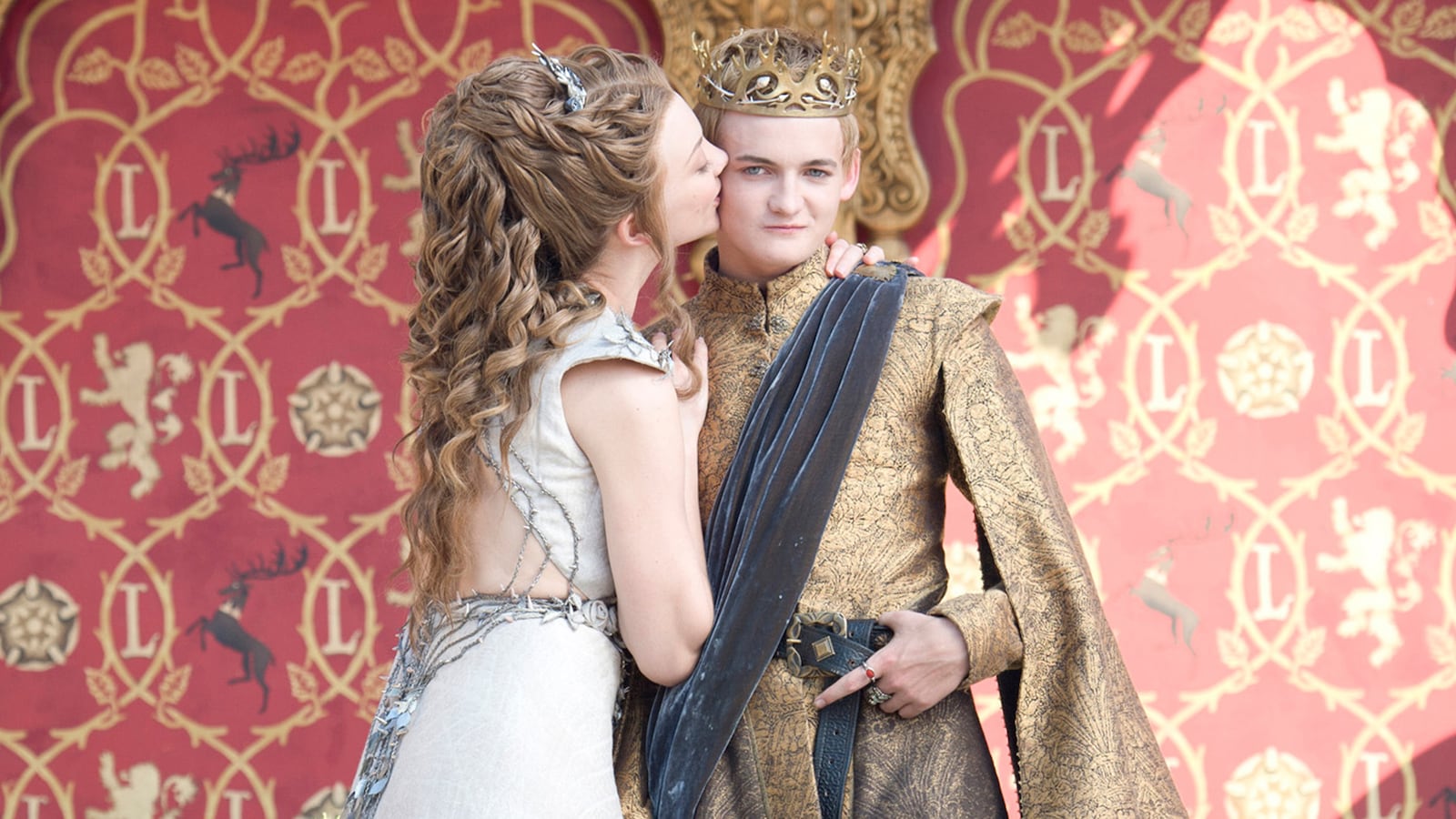In retrospect, we really should have seen it coming.

I am referring, of course, to the Big Shocking Plot Twist at the end of Sunday night’s episode of Game of Thrones. The one that everybody is tweeting about on Twitter. The one that everybody will be talking about tomorrow. The.one.that.changes.everything. (WARNING: If you haven't seen "The Lion and the Rose" yet, stop reading now. The rest of this story will consist of nothing but spoilers.) We got our first clue last week when Arya Stark and The Hound stumbled across a tavern in the woods. Peering through the brush, Arya spied Polliver, the jabbering Lannister lackey who stole her sword Needle and stabbed her pal Lommy with it.
"Needle?" the Hound snapped. "Of course you named your sword."
"Lots of people name their swords," Arya said.
"Lots of cunts," The Hound replied.
Turns out this vulgar little exchange was actually the first half of an elaborate joke. It just took a week for the punchline to land.
But what a punchline it was. On Sunday night, Tywin Lannister finally gave his grandson, King Joffrey, a Valyrian steel sword of his very own. It's the day before Joffrey's wedding to Margaery Tyrell; the blade is Tywin's version of a blender. Gleeful, Joffrey leaps to his feat, stabs at the air, and immediately chops his uncle Tyrion's present—a book about some boring old kings—into confetti.
"Such a great sword should have a name," Joffrey shouts to his guests. "What should I call it?"
"Widow's Wail," one of them shouts back.
"Widow's Wail," Joffrey says. "I like that."
The king, in other words, is a c--t.
Which explains, I think, why he had to become a bug-eyed corpse 15 minutes later—foaming at the mouth, bleeding from the nose, poisoned to death by a bad goblet of wine.
Everyone knows that Game of Thrones is full of unsavory characters that behave in unsavory ways. But here's the thing: despite all its darkness and cruelty, the show ultimately doesn't tolerate c--ts. A c--t is different than your run-of-the-mill jerk (or scoundrel, or creep, or whatever). A c--t is two-dimensional. He has no redeeming or (even complicating) qualities—no depths to plumb, no angles to survey, no gray areas to explore. He is impossible to empathize with—or even understand. He has no humanity. He is a total... well, c--t.
Joffrey was the King of C--ts. Never mind the time he put hundreds of peasants to death because someone threw a cow pie in his face. Or the time he ran and hid—at his mother's behest—during the Battle of the Blackwater. Or the time he forced Sansa to gaze upon her father's severed head. Or the time his henchmen slaughtered every one of his father's (supposed) bastard babies. Or the time he impaled a hooker with his crossbow.
Just consider Sunday night’s episode. Joffrey's new sword was forged from Ned Stark's decommissioned blade, so when naming it he makes sure to declare—loud enough so Ned's daughter Sansa can hear—that "every time I use it, it shall be like cutting off Ned Stark's head again." When Brienne of Tarth approaches the king and his new queen at their wedding reception, Joffrey barely lets her finish her benediction.
"I hope your reign," she says, "is long and peacef..."
"Yes, yes," Joffrey interrupts, waving his hand to dismiss her.
Most excruciating of all is Joffrey's treatment of Tyrion. After giggling his way through a bawdy reenactment of the War of the Five Kings that managed to piss off pretty much everyone else in attendance—Tyrion because the players are dwarfs; Sansa because of her dad's de-meloning; Loras Tyrell because his lover Renly Baratheon is depicted as a horny degenerate—the king challenges his uncle to join the "contest." When the poised, courtly Tyrion demurs—and puts the challenge to his nephew instead—a desperate Joffrey attempts to reassert his authority by subjecting his uncle to a series of juvenile, escalating embarrassments: pouring wine on his head, commanding him to serve as cupbearer, insisting that the elder Lannister kneel. Measured, nearly silent, and unbearably tense, it's one of the most riveting scenes in Game of Thrones history. It's also a masterpiece of choreographed c--tery—Joffrey's final tour de force.
The young Irish actor Jack Gleeson was an inspired choice to play Joffrey. His features are so fine—his chin so narrow, his lips so thin—he doesn't quite appear fully-formed. His voice seems to be forever stuck at a pubescent pitch. And there's something supernatural—something sinister—about his oversized blue eyes. He looks like a cross between Caligula and an evil Bratz doll. Which is basically what Joffrey is (or rather was): an insecure, overindulged boy-sadist who preens, postures, and lashes out instead of actually learning how to wield his undeserved power. And yet the most remarkable thing about Gleeson wasn't his immaculately creepy looks—it was his immaculate performance. Playing a monster isn't as easy as it looks: the fewer nuances your character has—the more you're confined to one side of the spectrum—the harder it is to bring him to life. But somehow Gleeson was able to turn Joffrey inside out—to make him transparent. Every slight, every insecurity, every overcompensation, every lie, and every monstrous impulse registered on his face and reverberated through his live-wire frame. He was endlessly watchable, as awful as he was, because we could always see right through him. At first I was sad when I heard that Gleeson, a student at Trinity College in Dublin, plans to retire from acting after Game of Thrones. (He hates celebrity culture and wants to enter academia.) But then I realized that the kid might be on to something. He's so singular as Joffrey that it's impossible to imagine him ever really escaping the role.Either way, he couldn't have lasted much longer in Westeros. The Hound's joke—and its delayed punchline—neatly reinforced Game of Thrones' central moral code: the only characters worth watching are the ones who come in shades of gray. The actress Maisie Williams, who plays the ever-deadlier Arya Stark, put it best in a recent interview with The Daily Beast: "It’s a show with no lead character and one where there isn’t a goodie or a baddie," she said. "We only think Arya Stark is a good guy because it’s told from her point of view, and we think Polliver is a bad guy because he’s killed Lommy. But he could just be a guy doing his job with a wife and four kids to feed back at home. No one is good and no one is bad on Game of Thrones." No one who survives, at least. In Season 1, Ned Stark—the closest thing to a white knight—was decapitated. In Season 3, his son Robb—another valiant figure—was stabbed in the heart. Now Joffrey, the Starks' black-hearted antithesis, has met a similar fate. First we learned there's no room for heroes on Game of Thrones. Then we learned there's no room for villains.
Without the tension between good and evil—and without protagonists to embody that moral polarity—a lesser show would go slack. But in Westeros there are no protagonists, and death seems especially keen on eliminating both the good guys and the bad guys from the equation. What we're left with is a more ambivalent universe—and, ultimately, a richer one.
Think about where we wound up on Sunday. In the north, we not only saw that Ramsey Snow's torture techniques had worked: Theon Greyjoy, now a filthy, trembling slave named Reek, revealed that Bran and Rickon Stark are still alive. We also discovered that Ramsey, a bastard, is not quite the uncomplicated, irrational sadist he initially seemed to be. (Apparently, he longs for the approval of his father, Lord Bolton, whose clan has a long history of "flaying" their enemies.) Meanwhile, Bran & Co. are moving north to the Wall, driven by one of Bran's visions. Ramsey is on their trail.
In the south, chaos has broken out. The king is dead. His mother Cersei has accused her brother Tyrion—the cupbearer—of killing the boy; only minutes earlier she was rescuing a young girl from the "repugnant," "gnarled fingers" of an old lech. Tyrion seems innocent—he just saved his beloved Shae by shipping her off to Pentos, and he's still recovering—but what do we know? The denizens of King's Landing are virtuosos of deception.
Who will rule now? How? Who killed Joffrey? Why? And does all of this upheaval somehow end with Bran?
On a more reductive, less ambivalent series, losing a villain like Joffrey would lessen the conflict, and the creators would have to conjure up a new villain to take his place. But here, Joffrey's death instantly produced the opposite effect, reactivating old antagonisms and triggering new ones. That's because on Game of Thrones, conflict doesn't spring from competing moralities; it springs from competing desires. Technically, the show is supposed to be a fantasy. But that's about as realistic as drama gets.






